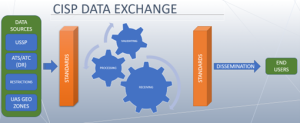The seven States and air navigation service providers (ANSPs) of the FAB CE airspace alliance – Austria, Bosnia & Herzegovina, Croatia, Czech Republic, Hungary, Slovakia and Slovenia – are developing a harmonised approach to developing U-space areas in response to the European Union Regulation establishing U-space areas within the EU, which came into force on January 26, 2023.
The functional airspace block has set up a UAS traffic management (UTM) Coordination Group (UCG) focused on three main areas: developing an understanding on roles and responsibilities for the development of common information services (CIS); developing a common FAB CE risk assessment methodology for the implementation of U-space airspace along with associated services; and understanding the procedures and technology for separating crewed and uncrewed aircraft operations.
According to a FAB CE press release:
“The developing of CIS provision and its integration in ATM system is an ANSP concern and there are still uncertainties around key issues of data provision requirements, such as security restrictions, business case and data provision.”
To assist FAB CE ANSPs in integration of appropriate CIS services a recent UTM Coordination Group meeting in Zagreb proposed to develop a FAB CE Book of standards for CIS-provider (CISP) data exchange. “This will include standardized data sets covering format, quality, latency security and so on. This will support ANSPs in the certification process, enable cross-border operations and open the door to potentially connecting (virtually) all national CISPs. It will also issue guidelines for technical specification of CISP systems procurement. Participating FAB CE ANSPs also agreed to work together on developing a common FAB CE risk assessment methodology for the implementation of U-Space airspace and associated services. The EU regulation gives ANSPs and airspace users the responsibility to ANSPs and airspace users for risk assessment and although many participants believed the ground risks were the key challenge, designated U-space airspaces will have to be supported by an airspace risk assessment.”

At the meeting, CroatiaControl ATCO Zelemir Trifunović presented the work that had been done to safely separate crewed and uncrewed aircraft in Croatia. In the “open” category, UAS flights can be approved via an automated process in five minutes after the request in pre-assessed airspace; “specific” category drones needing airspace outside the limits of the automated procedure have to request access at least seven days in advance of the planned operation. An airport drone detection system will be implemented soon to ensure non-registered UAS are kept safely away from commercial flights.
For more information
https://www.fab-ce.eu/news-media/news/289-fabce-ansps-move-to-harmonise-u-space-plans-and-procedures
(Image: Zagreb Old Town and cathedral in background – Shutterstock)




